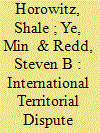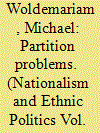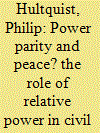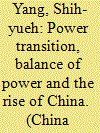|
|
|
Sort Order |
|
|
|
Items / Page
|
|
|
|
|
|
|
| Srl | Item |
| 1 |
ID:
174819


|
|
|
|
|
| Summary/Abstract |
Within international relations theory, there is significant disagreement on the nature and significance of leaders’ dispute outcome preferences. While many variants of realism assume that such preferences are relatively fixed and homogeneous, both the liberal and the constructivist schools view them as significant variables. This debate remains unresolved because, for the standard large-sample conflict data sets, there are no direct measures of leadership preferences over outcomes in given types of international disputes. Using a conflict bargaining experiment, we ask whether, after controlling for the effects of relative power and initial conditions, leadership preferences have a statistically significant impact. We use two different country samples—from China and the United States—to examine whether the impact of leadership preferences varies internationally. We find that realist-style preferences are a special rather than a general case, and that such differences have significant implications for understanding continuities and changes in Chinese and US foreign policies.
|
|
|
|
|
|
|
|
|
|
|
|
|
|
|
|
| 2 |
ID:
139807


|
|
|
|
|
| Summary/Abstract |
Under what circumstances does partition yield war between resulting successor states? This article probes the causes of the Eritrean-Ethiopian War (1998–2000) in an effort to offer tentative answers. The evidence suggests that in this particular case, the causes of postpartition war reflected a more general cause of war: disagreements over relative power. These disagreements were underpinned by the divergent historical memories maintained by ruling elites in each country about the joint revolution that brought them to power and partitioned the Ethiopian state. Based on a wide array of materials, this article contributes to debates on the comparative study of partition, while providing new insight into the origins of the Eritrean-Ethiopian War.
|
|
|
|
|
|
|
|
|
|
|
|
|
|
|
|
| 3 |
ID:
124112


|
|
|
|
|
| Publication |
2013.
|
| Summary/Abstract |
Theories of civil war highlight how relative power affects conflict onset, dynamics, strategy, outcome, and duration. Yet most studies of civil war have not been able to capture rebel power adequately and often rely on national-level characteristics to infer relative power distributions. This study addresses this shortcoming by using a troop strength measure to test arguments about how relative power affects the likelihood of civil conflict settlement. Drawing on the international crisis bargaining literature, while noting the inherent differences between interstate and intrastate conflicts, this study argues that the condition of power parity increases the likelihood of negotiated settlement and ceasefire. Weak rebels are unable to achieve concessions through negotiation since governments view them as minor threats. Yet governments have difficulty defeating weak rebels due to an emphasis on guerrilla warfare. On the other end of the spectrum, rebels that are superior to the government in strength are unlikely to settle given their power advantage. Strong rebels that can rival the strength of the government (i.e. they are near parity) can exact more concessions because fighting at parity exposes information about how long each side can hold out while escalating the costs of war, giving each side a greater incentive to negotiate and eventually seek a ceasefire or peace agreement. This argument is supported using data on 112 dyads in the post-Cold War period.
|
|
|
|
|
|
|
|
|
|
|
|
|
|
|
|
| 4 |
ID:
124277


|
|
|
|
|
| Publication |
2013.
|
| Summary/Abstract |
The rise of China is a major theme in international relations for both scholars and statesmen. Based on existing theories, namely the power transition theory and the balance of power theory, China's rise is forecasted to be violent, either by challenging the existing hegemon or by inviting counterbalancing efforts. Nonetheless, these arguments are highly controversial and lead to a neglect of theorization about rising great powers. Therefore, this article attempts to revisit and revive the theoretical discussions and present a refined theory of rising great powers that can explain the past and illuminate the future. to provide a clear picture of capabilities, the refined theory exclusively focuses on material variables. The theory demonstrates that the different material contexts in which great powers rise explain the differences in their external behaviors and how they are treated by existing great powers.
|
|
|
|
|
|
|
|
|
|
|
|
|
|
|
|
|
|
|
|
|